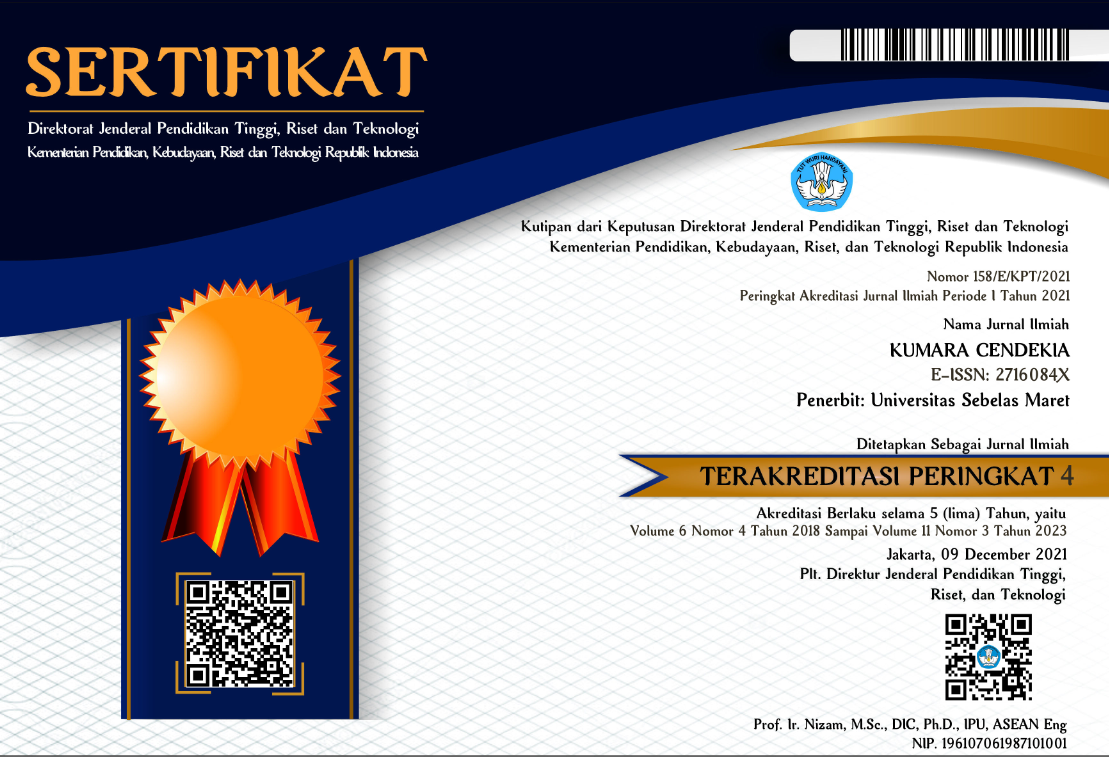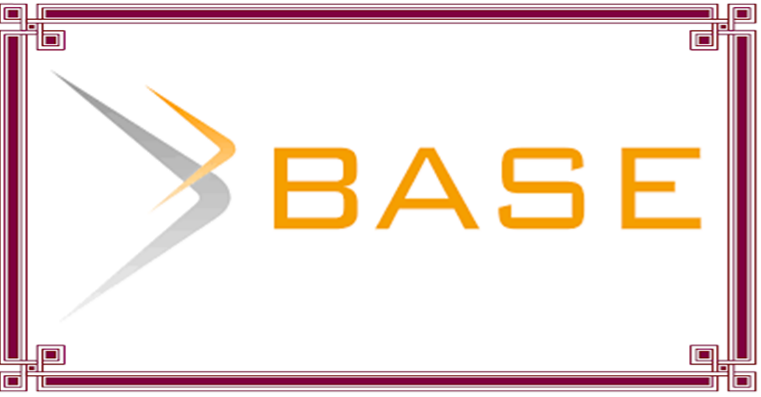PENGARUH PERMAINAN UNPLUGGED CODING TERHADAP KEMAMPUAN BERPIKIR KOMPUTASIONAL ANAK USIA 5-6 TAHUN
Abstract
Keywords
Full Text:
PDFReferences
Bers, M. U., González-González, C., & Armas-Torres, M. B. (2019). Coding as a playground: Promoting positive learning experiences in childhood classrooms. Computers & Education, 138, 130–145. https://doi.org/10.1016/j.compedu.2019.04.013
Bers, M. U., & Sullivan, A. (2019). Computer science education in early childhood: the case of ScratchJr. Journal of Information Technology Education: Innovations in Practice, 18, 113–138. https://doi.org/10.28945/4437
Bhatt, S., Verbert, K., & Noortgate, W. Van Den. (2024). A method for developing process-based assessments for computational thinking tasks. Journal of Learning Analytics, 11(2), 157–173. https://doi.org/10.18608/jla.2024.8291
Chalmers, C. (2018). Robotics and computational thinking in primary school. International Journal of Child-Computer Interaction, 17, 93–100. https://doi.org/10.1016/j.ijcci.2018.06.005
Christi, S. R. N., & Rajiman, W. (2023). Pentingnya berpikir komputasional dalam pembelajaran matematika. Journal on Education, 5(4), 12590–12598. https://doi.org/10.31004/joe.v5i4.2246
Fitriyah, Q. F., Saputri, L. R., & Aljawad, H. I. (2023). Praktik unplugged coding berbasis daily lives dalam meningkatkan computational thinking pada anak usia dini. Jurnal Pendidikan Anak, 12(2), 176–185. http://dx.doi.org/10.21831/jpa.v12i2.57349
Hasbi, M., Nugraha, A., Mudarwan, Mumpuni, N. D., Warsito, I. H., & Sylvia, N. (2020). Konsep pembelajaran coding serta peran PTK, orang tua, mitra dan komunitas dalam penerapan pembelajaran coding di satuan PAUD. Modul I, 1–48.
Hasjiandito, A., Waluyo, E., Nugroho, A. A. E., Wantoro, W., & Listanto, V. (2022). Active distance learning to improve kindergarten teachers’ computatitonal thingking skills. ThufuLA: Jurnal Inovasi Pendidikan Guru Raudhatul Athfal, 10(2), 235–252. https://doi.org/10.21043/thufula.v10i2.16120
Kong, S.-C., & Abelson, H. (2019). Computational Thinking Education. https://doi.org/10.7551/mitpress/13375.003.0002
Kotsopoulos, D., Floyd, L., Dickson, B. A., Nelson, V., & Makosz, S. (2022). Noticing and naming computational thinking during play. Early Childhood Education Journal, 50(4), 699–708. https://doi.org/10.1007/s10643-021-01188-z
Kumala, R. A. D., Rasmani, U. E. E., & Dewi, N. K. (2021). Profil kemampuan computational thinking anak usia 5-6 tahun. JIV-Jurnal Ilmiah Visi, 16(1), 81–96. https://doi.org/10.21009/jiv.1601.9
Lee, J., & Junoh, J. (2019). Implementing unplugged coding activities in early childhood classrooms. Early Childhood Education Journal, 47(6), 709–716. https://doi.org/10.1007/s10643-019-00967-z
Lee, T. Y., Mauriello, M. L., Ahn, J., & Bederson, B. B. (2014). CTArcade: Computational thinking with games in school age children. International Journal of Child-Computer Interaction, 2(1), 26–33. https://doi.org/10.1016/j.ijcci.2014.06.003
Lin, S. Y., Chien, S. Y., Hsiao, C. L., Hsia, C. H., & Chao, K. M. (2020). Enhancing computational thinking capability of preschool children by game-based smart toys. Electronic Commerce Research and Applications, 44(August), 101011. https://doi.org/10.1016/j.elerap.2020.101011
Maulita, P. P., Harianti, P., Andriani, R., & Marini, A. (2022). Membangun karakter siswa melalui literasi digital dalam menghadapi pendidikan abad 21. Jurnal Pendidikan Dasar dan Sosial Humaniora, 2(2), 395–402. https://doi.org/10.53625/jpdsh.v2i2.4195
Mutoharoh, Hufad, A., Faturrohman, M., & Rusdiyani, I. (2021). Unplugged coding activities for early childhood problem-solving skills. JPUD - Jurnal Pendidikan Usia Dini, 15(1), 121–140. https://doi.org/10.21009/jpud.151.07
Mutoharoh, Munawar, M., & Diyah, D. P. (2023). Kegiatan unplugged coding untuk meningkatkan kemampuan berpikir logis dan kritis anak usia dini. Prosiding Seminar Nasional Program Studi Pendidikan Guru Pendidikan Anak Usia Dini “Transisi Paud Ke SD Yang Menyenangkan.”
Nurhopipah, A., Nugroho, I. A., & Suhaman, J. (2021). Pembelajaran pemrograman berbasis proyek untuk mengembangkan kemampuan computational thinking anak. Jurnal Pengabdian Kepada Masyarakat, 27(1), 6–13.
Özden, C., & Tezer, M. (2018). The effect of coding teaching on students’ self-efficacy perceptions of technology and design courses. Sustainability, 10(10), 3822. https://doi.org/10.3390/su10103822
Parham-Mocello, J., Nelson, A., & Erwig, M. (2022). Exploring the use of games and a domain-specific teaching language in CS0. Annual Conference on Innovation and Technology in Computer Science Education, ITiCSE, 1(1), 351–357. https://doi.org/10.1145/3502718.3524812
Silvia, P. (2022). Analisis kemampuan computational thinking melalui pembelajaran coding pada anak usia dini 0-8 tahun. Journal of Islamic Early Childhood Education (JOIECE): PIAUD-Ku, 1(2), 50–59. https://doi.org/10.54801/piaudku.v1i2.140
Sugiyono. (2022). Metode Penelitian Kuantitatif Kualitatif dan R&D. Bandung: CV Alfabeta
Threekunprapa, A., & Yasri, P. (2020). Patterns of computational thinking development while solving unplugged coding activities coupled with the 3s approach for self-directed learning. European Journal of Educational Research, 9(3), 1025–1045. https://doi.org/10.12973/eu-jer.9.3.1025
Refbacks
- There are currently no refbacks.












